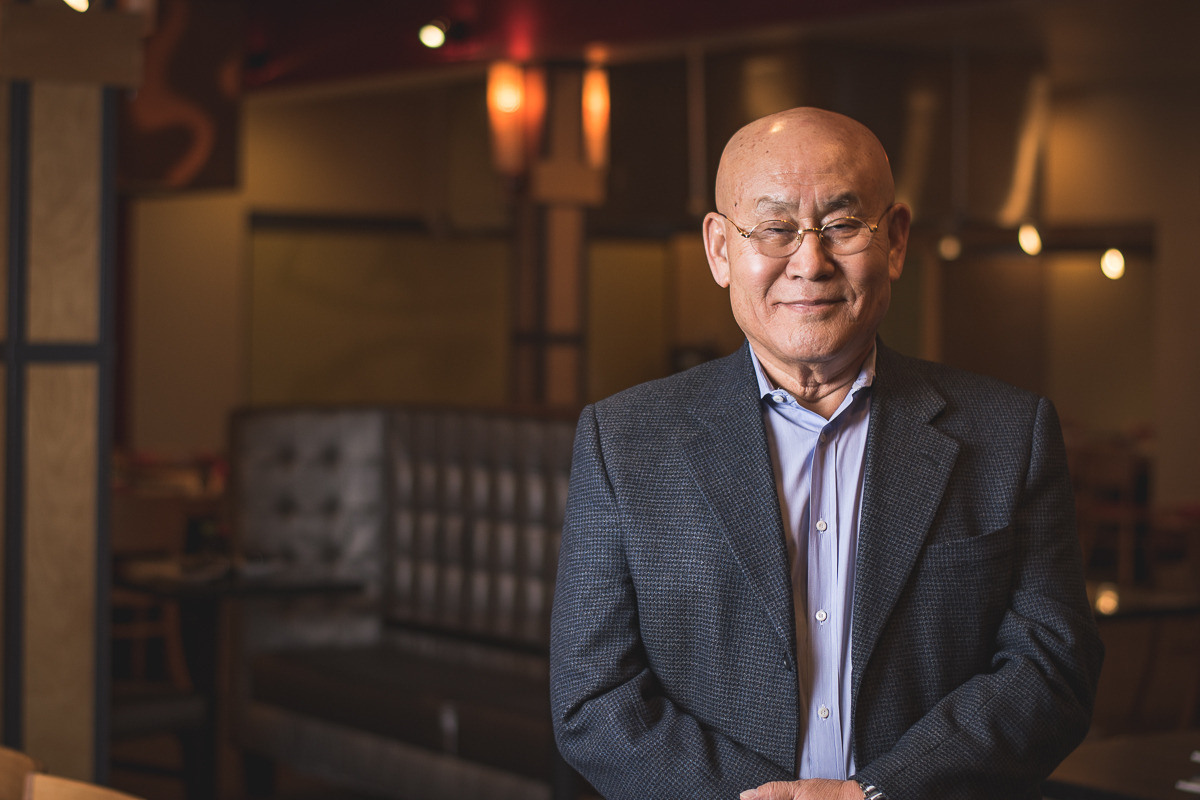
For Manish Shah, owner of Maya Tea, chai percolated unobtrusively in the background of his childhood. Perhaps I’m expecting a swell of nostalgia when I ask him to recount memories of drinking the spiced tea as a child. But Shah, known in part for his witty brand of sarcasm, kind of chortles. “I learned two things to make in the kitchen as a child,” he says, “One is scrambled eggs. And two — to make chai.”
Born in Mumbai, India, Shah moved to New York with his family when he was two years old. When Shah was nine, he and his family moved to Tucson, where they managed a motel. Of his early days in Tucson, Shah remembers the perpetual busyness of his parents and the constant obligations presented by the motel. But despite the round-the-clock nature of the job, Shah says his parents found pockets of time to indulge in their chai ritual.
Shah laughs and then recalls how he began to prepare the drink for his parents two or three times each day. He says, “They were getting tired of making [the chai], and they were like, you freaking make it.”
But it wasn’t until 1995, three years after Shah had graduated from the University of Arizona, that he began to think of chai as a business opportunity. The drink had been steadily gaining popularity since the 1960s, but it was finally becoming standard in mainstream coffee shops and restaurants.
“‘To be totally truthful,’ Shah tells me, ‘I got into the tea business because chai was getting hot.'”
Along with the increasing popularity of chai came emerging market potential for the right entrepreneur. And for Shah, who grew up making the stuff for his parents on the stovetop, the business opportunity seemed a natural fit.
“It was something that I knew how to make, and I thought it would be interesting,” he remembers.
The beginning of Maya Tea resembles the typical small business bootstrap story— a visionary sees potential, chooses to take a risk despite limited resources, and engages with a whole lot of trial and error.
“I worked two jobs, lived in a shithole apartment, and had a 1953 O’Keefe and Merrit stove that I resented because it was such a shitty old stove,” Shah remembers, and then attempts to explain the arduous process of adjusting his mother’s recipe for larger batches and a commercial market.
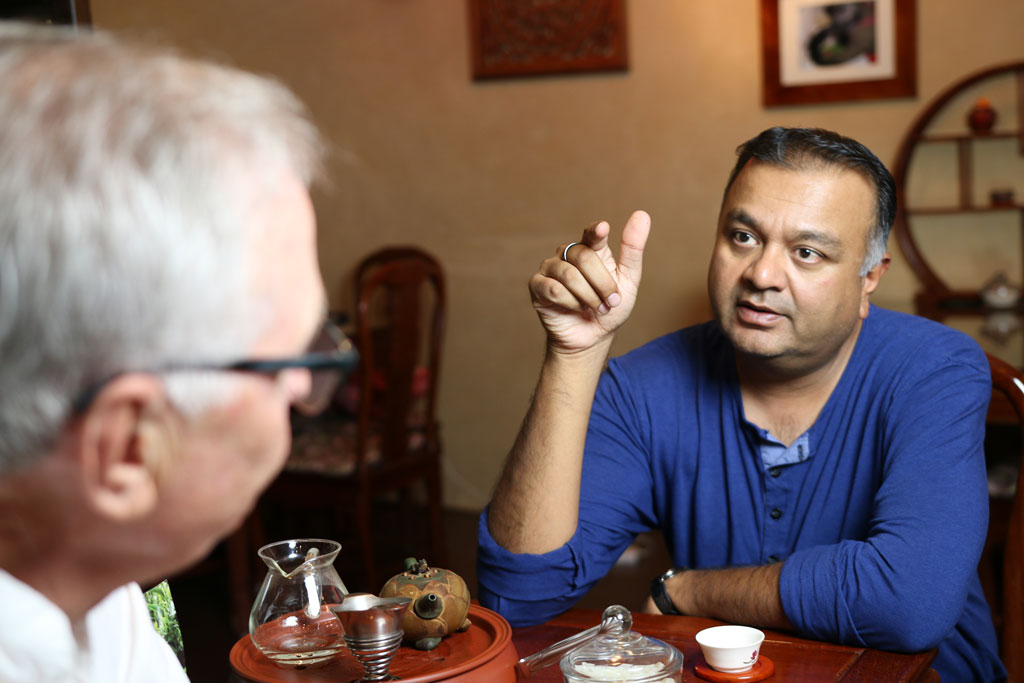
“I would get jacked,” he says, “I would be drinking it and trying it. I couldn’t sleep. It created […] havoc in my life because I didn’t sleep for three or four months.”
It’s easy to imagine a younger over-caffeinated Shah, weary from sleep deprivation, cursing at the knobs on the stove. Adding cardamom and cinnamon, ginger, a pinch of black pepper, slurping chai from the end of a spoon, and then tossing the entire batch into the sink.
Thus began an epic crawl to market — Shah’s long nights over the stove, sending batch after batch of experimental blends to tea-packaging companies, closing tea bags with an iron in his apartment, Maya Tea’s first booth at the farmers’ market in 1996, and Shah taking over as the St Phillips Plaza farmers’ market manager in October of 2002.
***
While Shah was cursing over his stove and beginning to sell products at the farmers’ market, another Tucson tea company was coming to fruition. Enter Austin and Zhuping Hodge, the owners of Seven Cups Tea House.
I’ve been enamored with the place since my writing group used to meet there for weekly writing sessions. The ambiance is cozy, clean, and quiet. A fish tank gurgles in the corner. The employees seem to float from table to table, speaking in soft voices and bestowing an impressive amount of tea knowledge onto their guests.
Selecting from the Seven Cups tea menu is like selecting a favorite line from a novel. One gets the impression that the words on the menu are as special and authentic as the tea itself, and the task feels daunting.
Upon finally selecting a tea, each pot must steep for a certain amount of time. Inside glass teapots, jasmine balls erupt, and herbs and flowers bloom into shapes like clouds.
Seven Cups is the kind of place that is impossible to leave without feeling a little more centered. But when I set out to write this article, I knew very little about its owners or its history.
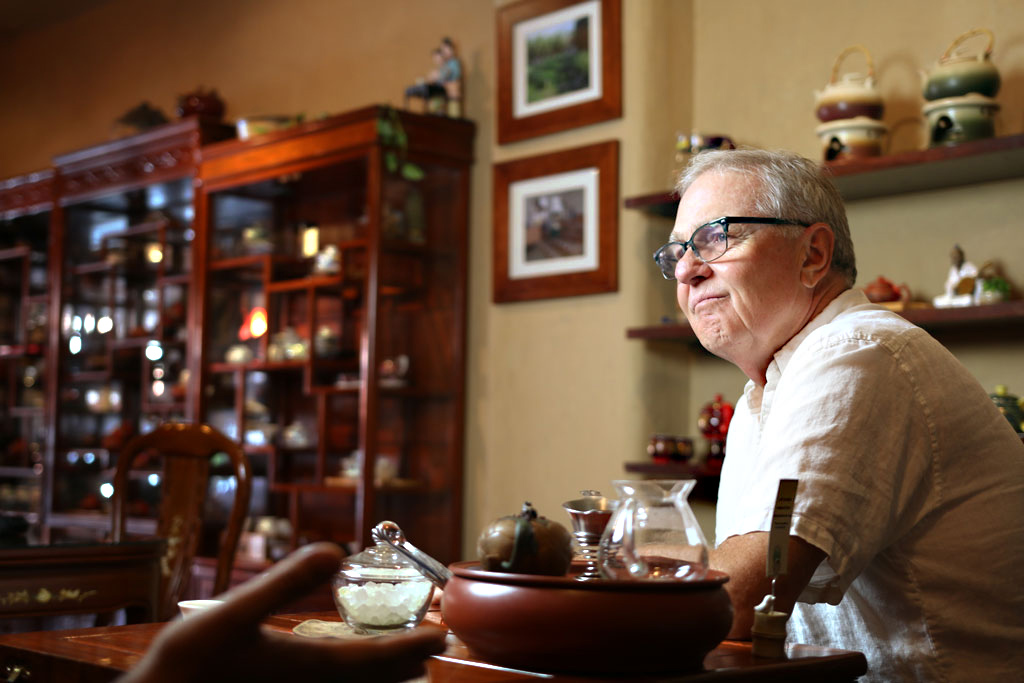
“Do you drink tea?” Austin Hodge asks me during our phone interview, catching me off guard.
“Sure, I like tea,” I say, but I stammer and eventually admit to being more of a coffee drinker. I’m prepared for this to be a little awkward — to admit my love for coffee while discussing the nuances of the tea industry with the Austin Hodge, internationally renowned tea scholar. But he handles it in stride.
“Sometimes I love to get a cafe latte. It’s a little bit of a secret pleasure,” Austin says to me. This makes me like him immediately. It also reminds me that he’s a real person, even though he’s heralded as a kind of tea rockstar.
“‘It’s not an either-or thing,’ Austin says, referring to the dual appreciation of coffee and tea. ‘The great thing about tea is that you don’t need to know a lot to enjoy it.’”
The story of Seven Cups goes like this: in 1991, Austin—who, at that time, was a psychotherapist and writing computer code —was gifted loose-leaf Chinese tea by a friend studying at the University of Arizona. Austin remembers being blown away by the quality and taste. He began to research how to order more, only to discover that Chinese tea was impossible to source from the United States. Austin was perplexed and then intrigued.
“It didn’t make any sense economically,” he tells me and then admits to being a problem-solving type of guy, drawn to anomalies. Austin simply could not understand why there was a lack of Chinese tea in the United States, despite the fact that U.S. trade with China had been open since the 1970s.
By the late ’90s, Austin was living in Tucson and commuting to Sacramento for his coding job. Though the tech industry paid well, he was becoming less fulfilled. By that time, Austin’s primary support network consisted mainly of Chinese families living in Tucson. He began taking Chinese classes and then finally began traveling to China in 1999. His goal was to learn as much as he could about tea and the people connected to it. He studied the supply chain and the export system, which seemed strangely opaque and sketchy.
In 2001, he began building the business that would become Seven Cups. “Part of what I wanted to do from the very beginning was to have a tea company that was completely oriented around ethics and transparency,” Austin says. “And really, we’re the first [tea] company ever to do that.”
Over many trips to China, Austin connected with tea growers, makers, and purveyors. In 2001, he met Zhuping, who had left a dissatisfying career of her own in commercial real estate. She began to study Chinese tea and tea history and was quickly becoming a true expert on the subject. Austin and Zhuping were married in 2003 and opened the Seven Cups Tea House in 2004. It became the first traditional Chinese teahouse in the Southwestern United States.
***
In the early 2000s, while Maya Tea and Seven Cups were still in their humble beginnings, Austin approached Shah about selling tea at the St Phillips Farmers’ Market. Austin and Zhuping sold products at four weekly farmers’ markets until they opened the tea house. The Shahs and Hodges became fast friends, getting together regularly to discuss the tea business. And as testament to how parallel their lives became, each of their youngest sons—now age 11—were born within weeks of one another in the same delivery room at Tucson Medical Center.
But Seven Cups and Maya Tea are as vastly different in their business approaches as Austin and Shah are in personality. Shah curses like a sailor and talks so fast I can barely keep up in my interview notes. Austin is laid-back, pensive, and soft-spoken. It is then fitting that they have each nurtured businesses that reflect and build off of their interests and personalities.
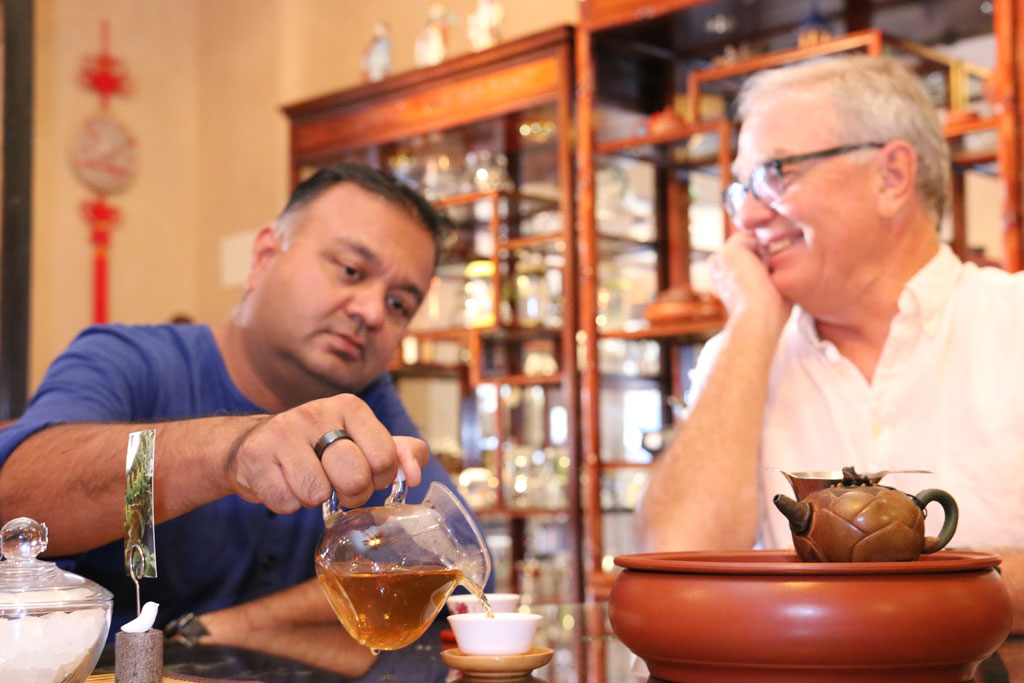
There is an impressive level of mutual respect between Shah and Austin. Recently, while Zhuping was in China, Shah and his son took Austin out to dinner for his birthday.
Both Austin and Shah sing praises of the other, though are quick to point out the differences in their models. Both owners agree on the distinction— Shah is in the beverage business, and the Hodges are in the tea business.
Shah caters to the mainstream market. He estimates that ninety-nine percent of his business is selling wholesale to coffee shops and restaurants who brew and serve Maya Tea products to customers. His 8,500 square foot warehouse stores hundreds of ingredients for Maya Tea’s enormous product line. Shah buys tea and herbs through brokers and group buying. The ingredients are shipped by boat from the country of origin into ports all over the United States.
At present, Shah is sourcing ingredients from at least 40 different countries—hibiscus from Egypt, cardamom from Guatemala, rooibos from South Africa. Shah cannot tell you who grew his ingredients, because that is not his model. His model is big, and his business is beverage.
Shah attributes the success of Maya Tea to years of hard work, the development of the internet, savvy business decisions, and a slow—sometimes painfully slow—upswing in tea trendiness in the United States.
As consumer demand has changed, Shah has diversified his product line beyond just chai. When customers began asking for additional varieties of tea, Shah delivered. And because 85% of tea consumed in the United States is iced tea (according to the Tea Association of the USA), Shah also developed a line of iced teas.
In 2005, he developed a liquid chai concentrate and then a second spicy chai concentrate in 2012, both of which have become incredibly popular and are shipped all over the United States.
“That’s when shit took off,” Shah says, adding a semi-emotional “that’s my baby,” in reference to the liquid chai concentrate.
Maya Tea’s website contains an online store, blog, and a selection of how-to videos. Shah has also produced over one hundred episodes of his podcast, Steeping Around, in which he muses aloud about all things tea. He interviews Top Chef host Padma Lakshmi, demonstrates the use of tea as a culinary ingredient, tackles cigar and tea pairings, spotlights tea-infused beer, and ventures into the history of reading tea leaves. Though the podcast aired its final episode in 2013, it can still be accessed in its entirety.
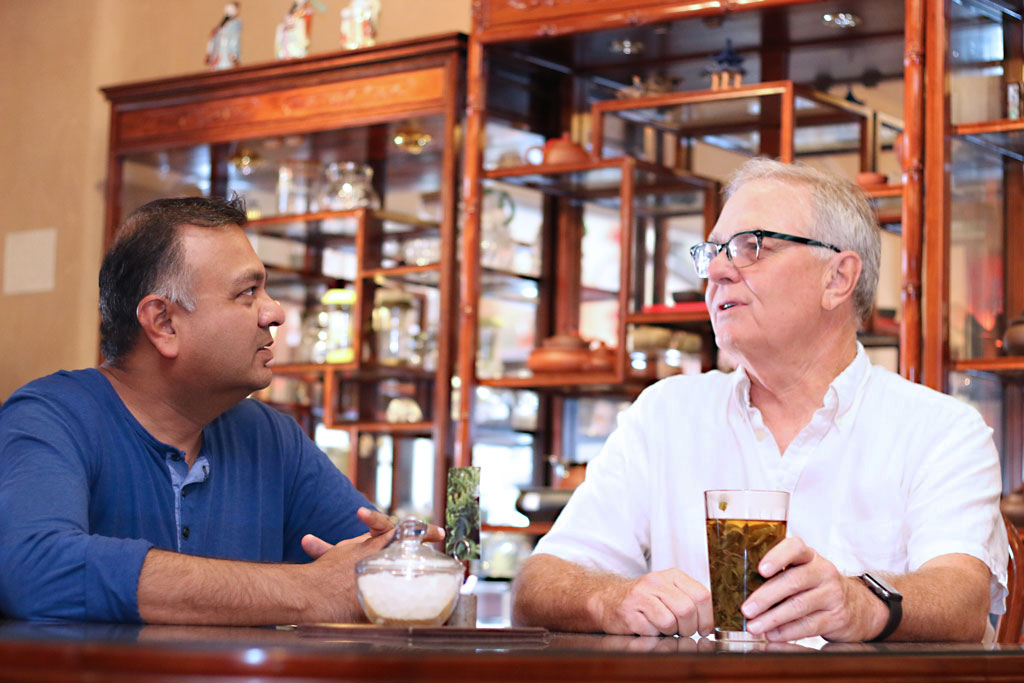
While Shah has jumped with bravado into the mainstream consumer base, Austin and Zhuping have focused their efforts differently.
The Hodges have traveled to China countless times, building their knowledge of tea and nurturing relationships with the people who grow and make it.
They have focused almost exclusively on Chinese teas, and pride themselves on cultivating personal relationships with each grower and maker involved in producing the tea sold by Seven Cups. They have become true scholars of tea, studying the different ways it grows, and how climate, region, moon cycles, and picking methods ultimately play a role in the end result.
Here in Tucson, the Hodges employ a small group of dedicated staff members, who care about tea as much as they do. Austin says they keep the tea house immaculate (“not a speck of dust”) and, in all the years they have been in business, have never failed to ship products out on the same day they receive an order.
But because they are not catering to the mainstream market, the Hodges have had to spend a significant amount of time educating their potential customer base.
“One of the difficulties for what we do is we have to make a market that doesn’t exist,” Austin explains, “because exposure for this level of tea at this price — there’s no market for it.”
The Seven Cups website serves as a web store for the hundreds of domestic and international locations that place orders for Seven Cups’ product. The website is also home to the Seven Cups tea blog, which contains a vault of useful information for the curious tea drinker.
It also advertises their annual educational trips to China, which the couple began in 2007, in order to show off the beauty of China’s tea growing regions.
The Hodges are famous in the tea world. Like, really famous. Austin says that Zhuping is one of the “premiere scholars alive when it comes to Chinese tea and Chinese tea history.” And Austin has become one of the world’s leading tea experts, most recently pushing for international standards for specialty teas by drafting proposals, speaking at trade shows, and meeting with government officials and tea producers in India and China.
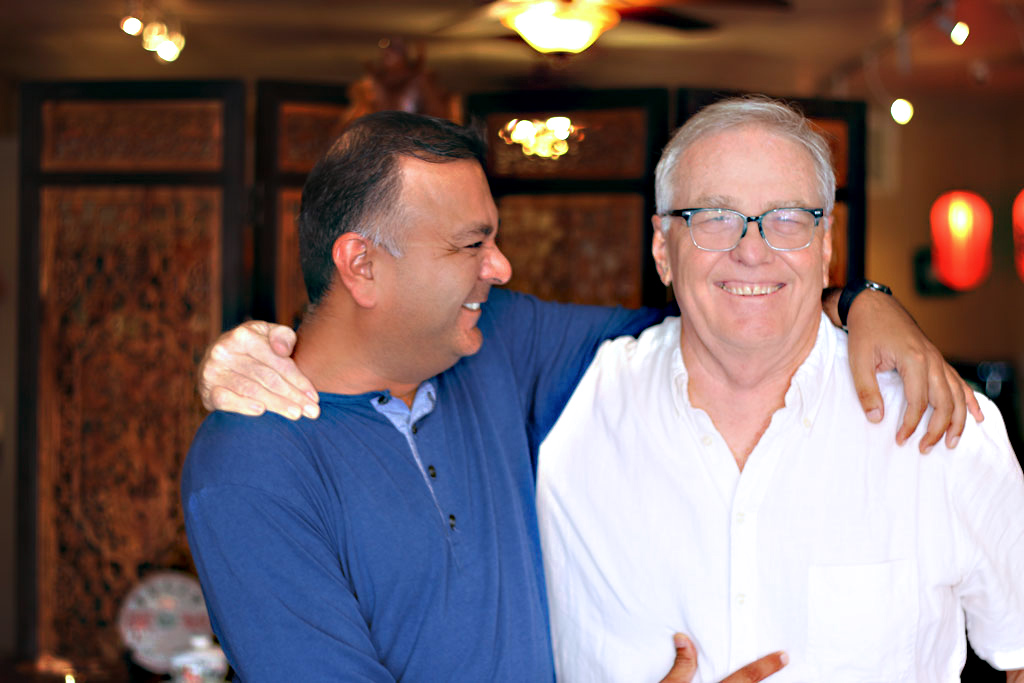
In the beginning, no one could know that these two businesses would become such respected institutions in the United States tea scene and beyond.
Shah says, “It’s hard to put this into perspective. [Austin] and I both started out as a couple of dumbasses at the farmer’s market. And now, he is widely regarded as the expert in Asian tea. He is so well respected. His name is at the top of the list of experts about Chinese tea in the country.”
And Manish Shah has a different story. He’s the beverage guy, the showman. Austin says of Manish, “I love Manish. He’s been my good friend forever. He’s taken a more conventional route, but I’ve got a lot of respect for him.”
With over fifteen years under their belts, both companies have a clear mission, customer base, marketing approach, and no plans to stop. As Shah says, “Austin’s not done, and neither am I. We still have a long way to go.”
For more information on Maya Tea, visit mayatea.com or call (520) 918-9811. Seven Cups Fine Chinese Teas is located at 2516 E. Sixth St. For more information, visit sevencups.com or call (520) 881-4072.